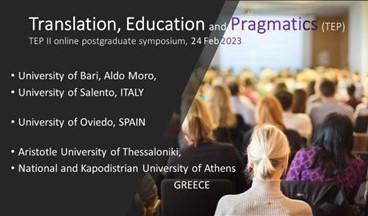Description
Teaching cross-cultural pragmatics through AVT (Vasiliki Papakonstantinou)
The study attempts to explore how audiovisual translation (AVT) can introduce cross-cultural pragmatics to Greek learners of English. The data derive from the animated film Inside Out (Pixar 2015), namely, from the Greek subtitles and dubbing script of the first 45 minutes of the film, in which all the basic characters are introduced and the plot starts to unravel. The study takes dubbed dialogues to be a target-oriented data set, with the subtitles as an intermediate, constrained type of discourse where pragmatic shifts may be least visible or not at all. The research uses (a) the positive/negative politeness distinction as manifested through ‘inter¬personal proximity/distance’ between interlocutors, respectively (Brown and Levinson 1978, Sifianou 1992, Yule 1996), and (b) the ‘un/certainty avoidance’ communication style (Hofstede, Hofstede and Minkov 2010). The aim is to familiarize learners with the significance of pragmatic variation awareness and their use in EFL teaching. Both etic and emic approaches are applied: the analyst’s view is followed by a questionnaire addressing 18 bilingual participants who confirmed the findings of the study. Results show types of pragmatic variation across English and Greek: for instance, the subtitles (which are closer to the ST English script) showed less signs of positive politeness strategies and more uncertainty features, while dubbing, (which is more natural Greek discourse) manifested more positive politeness strategies and stronger uncertainty avoidance. Findings are significant because they allow learners to look beyond grammaticality, at pragmatic preference. There is fairly little research on using translation to advance pragmatic compe¬tence in learners of English and highlight how translation can advance cross cultural pragmatic awareness in EFL.

